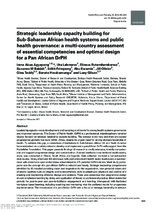| dc.contributor.author | Agyepong, Irene Akua | |
| dc.contributor.author | Lehmann, Uta | |
| dc.contributor.author | Rutembemberwa, Elizeus | |
| dc.contributor.author | Babich, Suzanne M. | |
| dc.contributor.author | Frimpong, Edith | |
| dc.contributor.author | Kwamie, Aku | |
| dc.contributor.author | Olivier, Jill | |
| dc.contributor.author | Teddy, Gina | |
| dc.contributor.author | Hwabamungu, Boroto | |
| dc.contributor.author | Gilson, Lucy | |
| dc.date.accessioned | 2018-07-17T07:15:05Z | |
| dc.date.available | 2018-07-17T07:15:05Z | |
| dc.date.issued | 2018 | |
| dc.identifier.citation | Agyepong, I.A. et al. (2018). Strategic leadership capacity building for Sub-Saharan African health systems and public health governance: a multi-country assessment of essential competencies and optimal design for a Pan African DrPH. Health Policy and Planning, 33: ii35–ii49 | en_US |
| dc.identifier.issn | 0268-1080 | |
| dc.identifier.uri | http://dx.doi.org/10.1093/heapol/czx162 | |
| dc.identifier.uri | http://hdl.handle.net/10566/3884 | |
| dc.description.abstract | Leadership capacity needs development and nurturing at all levels for strong health systems governance
and improved outcomes. The Doctor of Public Health (DrPH) is a professional, interdisciplinary terminal
degree focused on strategic leadership capacity building. The concept is not new and there are several
programmes globally–but none within Africa, despite its urgent need for strong strategic leadership in
health. To address this gap, a consortium of institutions in Sub-Saharan Africa, UK and North America
have embarked on a collaboration to develop and implement a pan-African DrPH with support from the
Rockefeller Foundation. This paper presents findings of research to verify relevance, identify competencies
and support programme design and customization. A mixed methods cross sectional multi-country
study was conducted in Ghana, South Africa and Uganda. Data collection involved a non-exhaustive
desk review, 34 key informant (KI) interviews with past and present health sector leaders and a questionnaire
with closed and open ended items administered to 271 potential DrPH trainees. Most study participants
saw the concept of a pan-African DrPH as relevant and timely. Strategic leadership competencies
identified by KI included providing vision and inspiration for the organization, core personal values and
character qualities such as integrity and trustworthiness, skills in adapting to situations and context and
creating and maintaining effective change and systems. There was consensus that programme design
should emphasize learning by doing and application of theory to professional practice. Short residential
periods for peer-to-peer and peer-to-facilitator engagement and learning, interspaced with facilitated
workplace based learning, including coaching and mentoring, was the preferred model for programme
implementation. The introduction of a pan-African DrPH with a focus on strategic leadership is relevant and timely. Core competencies, optimal design and customization for the sub-Saharan African context
has broad consensus in the study setting. | en_US |
| dc.language.iso | en | en_US |
| dc.publisher | Oxford University Press | en_US |
| dc.rights | VC The Author(s) 2018. Published by Oxford University Press in association with The London School of Hygiene and Tropical Medicine.
This is an Open Access article distributed under the terms of the Creative Commons Attribution License (http://creativecommons.org/licenses/by/4.0/), which permits
unrestricted reuse, distribution, and reproduction in any medium, provided the original work is properly cited. | |
| dc.subject | Capacity building | en_US |
| dc.subject | Governance | en_US |
| dc.subject | Health systems | en_US |
| dc.subject | Needs assessment | en_US |
| dc.subject | Public health | en_US |
| dc.subject | Strategic leadership | en_US |
| dc.subject | Sub-Saharan Africa | en_US |
| dc.title | Strategic leadership capacity building for Sub-Saharan African health systems and public health governance: a multi-country assessment of essential competencies and optimal design for a Pan African DrPH | en_US |
| dc.type | Article | en_US |
| dc.privacy.showsubmitter | FALSE | |
| dc.status.ispeerreviewed | TRUE | |

